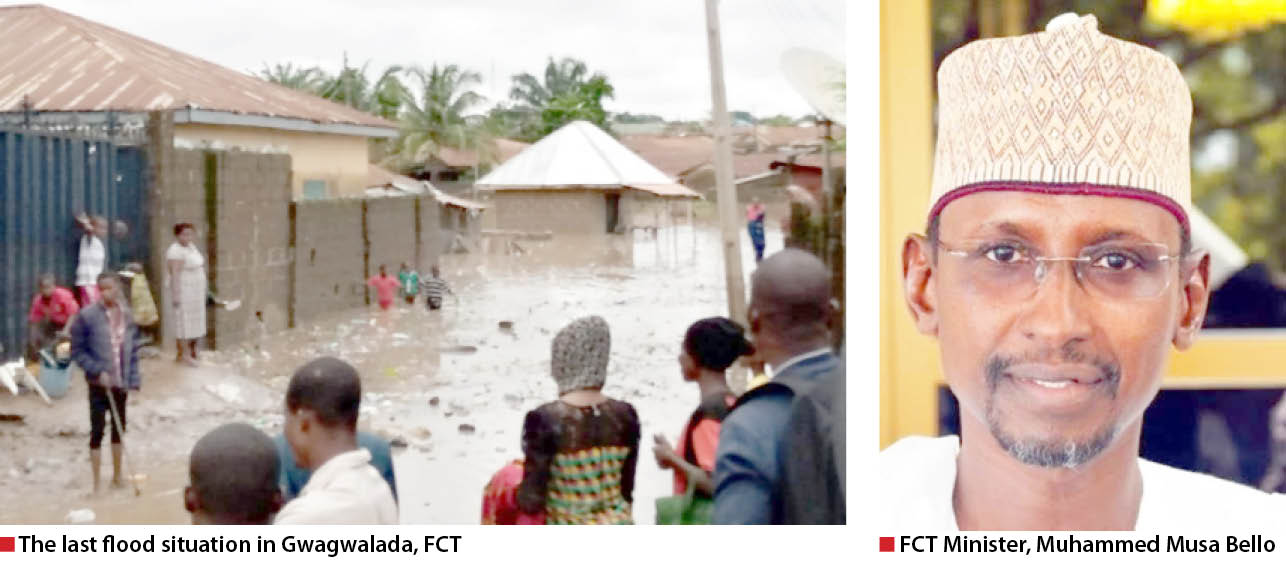The rainy season has brought back fear among residents of the Federal Capital Territory (FCT) amid the recurrent annual flooding in the nation’s capital, Daily Trust Saturdy reports.
Already, the flooding outlook released by the Federal Ministry of Water Resources had shown that the FCT is among the states that would be heavily hit this year.
- Buhari joins prayers for late UAE president
- FG should unleash ‘total federal might’ to crush insurgency – Lawan
Residents’ fear was further heightened when some parts of the city centre were heavily flooded during the early rains recorded in the territory few weeks ago.
Those early rains led to heavy floods in Dogongada (Lokogoma village), Damangaza and Apo Dutse in Gudu District.
Authorities of the Federal Capital Development Authority (FCDA) and residents are already trading blames over the city’s drainage network that is faulty, leading to flooded roads whenever it rains.
While the FCDA believes illegal structures and buildings on waterways and green areas were responsible for recent flooding in the FCT and environs, the residents, among them drivers, shop owners and property developers allege complicity on the side of authorities in tempering with the master plan.
They also alleged poor maintenance culture on the side of authorities.
A motorist was reportedly swept away by the last flood at Lokogoma because the drainages were blocked by filth.
Our correspondents report that on Thursday, May 19, the FCTA removed over 30 houses said to be on flood plain at Trademore Estate in Abuja.
The task force team, led by Senior Special Assistant on Monitoring, Inspection and Enforcement to the FCT Minister, Ikharo Attah, while fielding questions from journalists at the site, revealed that over 100 houses were marked, but that only 30 were removed.
According to him, “This is ongoing removal of illegal structures on the flood plains at the Trademore Estate along airport road. This estate has been a theatre of intensive flooding, and we have been engaging them for years and they have come to terms that this area is very dangerous to their lives. The Minister of the Federal Capital Territory, Malam Muhammad Bello, has asked us to remove all illegal structures on the flood plain. And that is what the machine behind me is doing.
“There has been excessive development on the flood plain in Trademore Estate…and this is very worrisome.
“All the houses that are going down were marked, and some had been marked as long as three years ago, some were marked at foundation, window and roofing levels. The final marking was about four days ago. And we gave them 48 hours, and even gave them additional 24 hours,” he said.
A resident, Sadat Bankole, who has been leaving in the area for over 10 years, said if the demolition would save and prevent further loss of lives, she would be in support of it.

The blame game
One of the residents, Mr Tajudeen Alarape, chided the agency saddled with drainage management in the FCT for not doing enough to clear the mess.
According to him, most of the drains have been covered with refuse, which needed a periodic evacuation.
Dr Mbanu Emmanuel alleged that the FCT master plan is being distorted, with illegal plots being built along the waterways, which often resulted to flooding in the affected areas.
“You see, some of these guys at the FCTA are in the know of some of these illegal structures, but because of one thing or another, they allow it to go. And the result is always the flooding you are talking about,’’ he said.
To Mallam Tijani Aliyu, while the population of the residents increases, the few facilities in the territory are overstretched.
“Facilities like road network, bridges, drainage system are not being properly maintained despite increased pressure from the growing population. This, alone, can lead to the collapse of some of these facilities like bridges, drains; and that can lead to massive flooding,’’ he said.
But the FCTA blamed the annual flooding on residents who are building illegally on waterways, indiscriminate dumping of refuse on water channels and drainages.
The Executive Secretary of the FCDA, Shehu Hadi Ahmad, an engineer, said the FCT minister, Mallam Mohammed Musa Bello, was concerned about the re-emergence of illegal construction of properties on waterways, saying the FCTA would not fold its arms nor sit back and allow the loss of lives and property by innocent residents. He said they would be ready to meet owners of such illegal properties in court if the need arose.
“What is happening in the city should serve as enough warning to everybody concerning NIMET’s 2022 prediction of the intensity of the level of rains expected this session. Therefore, the minister of the FCT, Mallam Muhammad Musa Bello, has directed that every construction on waterways must be removed, and anyone who is aggrieved should go to court. And we will be ready to meet them there,” he said.
He said most illegal constructions found to have blocked waterways, which were removed sometime in 2019 due to flooding that led to the death of a director in the Judiciary Service Commission, were fast finding their way back. He hinted that a meeting of relevant departments and agencies of the FCT would soon be convened to assess and reinforce earlier resolutions on the issue of flooding in the city.
He further revealed that the FCTA was also considering awarding contract for the full development of the ring road II (RR II), which will involve the replacement of the present box culverts with about six bridges as part of a permanent solution to the recurring flooding around Lokogoma and Galadimawa roundabout.
The Director-General of the FCT Emergency Management Agency (FEMA), Mallam Abbas Idriss, had stated that the advent of the rains, which the NIMET had forecasted to actually commence from of May 4, 2022, as well as the flooding in some parts of the city even before that date, called for the need for urgent collaboration between the agency and relevant stakeholders to ensure synergy and coordinated response before things get out of hand.
Idriss, who traced the situation of flooding in the city to urbanization, which has given rise to such infractions as building on flood plains and diversion of river courses by some estate developers, appealed to the FCDA as the custodian of the Abuja master plan to join hands with his agency by providing the necessary backing to forestall the activities of illegal developers who carry out their activities without recourse to the effect of climatic change.
While pledging their commitment to collaborate in the area of education and public enlightenment, the two organisations also appealed to residents, especially motorists, to be patient whenever it rains and allow it to subside, especially whenever the roads are flooded in order to avoid unnecessary loss of lives.
Estates, houses built on waterways to go – FCTA
The Coordinator, Abuja Metropolitan Management Council (AMMC), Shuaib Umar, has vowed not to foot-drag their planned demolition of all estates illegally developed on waterways
He stated this during a stakeholders meeting with both management and residents’ associations of Trademore Estate that was heavily flooded last year in Lugbe area of the FCT.
Umar said, “By next week, all these houses are going down. The solution to this is the removal of these houses. We won’t like ourselves at the detriment of others.
“Even a single house could cause problem for many people if it is not constructed at the right place.”
Also, the Director of the Department of Development Control, Muktar Galadima, who led a demolition squad to one of the offending estates in Lugbe District, said it was appalling that developers were jeopardising people’s lives.
Galadima noted that the Valley Hub Estate in Lugbe, which is already under the fire of bulldozers, violated development rules by illegally expanding and building on green area.
He also said that over 20 houses built along waterways at Trademore Estate and others would be demolished as scheduled after the ultimatum given to them.
Galadima added, “Now is the moment, those houses marked for removal are going. Anything that would come after can be resolved. The first thing now is to save lives and property.
“This demolition will not only be limited to Trademore estate, even the downstream we are going to remove all the houses that are on the flood plain.”
Residents’ fear
The rainy season generates apprehension among some residents in the city centre, considering that some people had died as a result of plying flooded roads or when their residences were flooded.
Areas often affected in Abuja are Lokogoma village, Damangaza, Apo Dutse, EFAB Estate, some parts of Gwarinpa, Kubwa, Gwagwalada and many other roads within the city that are usually flooded as a result of bad drainage network.
Some residents of Lokogoma village, popularly called Dogo Gada, who spoke with Daily Trust Saturday, said they were adversely affected by the floods.
A civil servant who pleaded anonymity said she was lucky when the bridge was flooded during the last rainfall as her boss instructed her to take the day off.
“He called me and said I should wait at home, that live was more important than work. Unknown to us, the incident was in the news,” she said.
But Emmanuel Joshua, a trader in Garki, said he did not have the luxury of taking the day off and couldn’t risk his life wading through the water. He had to wait for some hours for the flood to subside before leaving his house at the end of the last heavy downpour.
“The situation creates a dilemma for me because I am a hustler. No work means no food for me. And time is money, so staying long at home could affect what I return home with at the end of the day,” he said.
The community leader of Lokogoma village Eremiah Kampani said more than 10 people were swept away last year. The situation portends a great danger, he said, adding that as a motorist, he was saved by the whiskers after his vehicle was swept away by flood.
He said he was afraid the bridge could suffer the fate of the one near it inside a privately estate, EFAB, which has already been washed away by the floods.
“The bridge is our major challenge because it always collapses. And every year, when the rains start, we maintain the bridge, but this year is worse,” he said, adding that if the rains are little now, residents would worry about what could happen at the peak of the season.
He said the community had been relying on self-help to fix the road, adding, “I have called all the community leaders to get money to get a pall loader to fix some portions of the road. Up till now, the money is not yet complete. We have less than N200,000 but we need more than N300,000.
“We have a challenge; and the most painful part is that we are in the FCT. Many lives were lost in that river last year; the water carried more than 10 people. And this year, with the first rain, it was by the grace of God that we rescued one man. We are pleading with the government to help or support us to fix the road.
“This is the only access road we have. With a bridge done by the federal government and ceded to EFAB Estate, we were cut off.
“We are just suffering as if we were not part of the FCT,” he said, adding that if the territory were properly developed, the community would have gone past this challenge.
But some residents of EFAB Estate, who could not confirm that the bridge was ceded to them, said they were also not spared from floods.
One of the residents, Bolaji Adesola, said floods affected some parts of First Avenue, Phase Two and other places in the estate.
“This last rain flooded some houses where the Catholic Church was formerly located. This is despite the demolition by the government and several dredging by the estate management,” he said.
He said people relied on phone calls before leaving their houses whenever there was rain, even if it seemed not much.
Another resident, Hassan Muhammad, said though his house was not located in the flood-prone area, everyone in the estate is affected when it floods.
“I stay along 14 Road and off the bridges, but we can’t rest nor sleep well during rainfall,” he said.
Another EFAB resident, Haruna Abdullahi, also on the same place but closer to the flood-prone areas said, “I always look outside the window when it rains at night. In the past, people had died from flooded houses in this estate; and that fear won’t let you sleep well during the rainy season.”
Kompani was worried about the fate of the residents as the government had announced that the rains would commence in the FCT on May 14 and residents should expect ‘a little above normal rainfall this year.’
Residents of Gwagwalada are also pleading with the federal government and the FCTA to find a lasting solution to the perennial flooding in their communities.
Mathew Inawole, one of the residents, recalled what happened in the community last year, where many lives were lost to the flooding that ravaged the community.
He said it was becoming an annual occurrence and without a solution from those in positions of authority.
“Our fear now is the possibility of experiencing more devastating incidents this year as the flooding outlook released by the Ministry of Water Resources had named Gwagwalada as one of the most dangerous areas prone to flooding this year,’’ he said.
At Dutsen Alhaji, a community in Bwari Area Council, residents have pleaded with the FCTA to come to their aid by clearing the waterways that usually cause heavy flooding in the community.
Tony Joseph, one of the residents specifically mentioned the situation at the Sokale area of the community and urged the administration to move in.
What must be done – Experts
An architect, Ifeanyi Uzoigwe, said there was a need for the FCTA to evaluate a dam located at Alieta, a community before Lugbe, which has collapsed and is contributing to the flooding in Lugbe and some other parts of the territory.
Uzoigwe, who was a representative of Trademore Estate at the meeting with the FCTA, noted that some of the water channels in the territory needed to be expanded urgently.
Mr Joseph Oseni, a town planner, stressed the need for strict adherence to the FCT master plan to check indiscriminate building on water channels.
“All FCT agencies should be alive to their responsibilities. For instance, the drainages need to be adequately maintained. And periodic evacuation of refuse is needed to discourage residents from dumping them on the waterways,’’ he said.

 Join Daily Trust WhatsApp Community For Quick Access To News and Happenings Around You.
Join Daily Trust WhatsApp Community For Quick Access To News and Happenings Around You.


